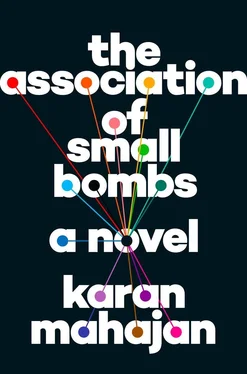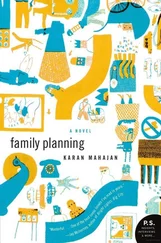Shockie was the leading bomb maker of the Jammu and Kashmir Islamic Force, which operated out of exile in Nepal. An avuncular-looking man of twenty-six, he had catlike green eyes, wet lips, and curly hair already balding on the vast egg of his head. His arms were fat rods under his kurta. In the past four years he had killed dozens of Indians in revenge for the military oppression in Kashmir, expanding the JKIF’s “theater of violence,” as the newspapers called it.
Now he pushed the receiver close to his ear in the PCO booth. Deep in a crater of silence on the other side of the Himalayas, the phone rang. The phone was a drill seeking out life. “You’re sick,” he imagined saying to his mother. “Should I come?”
His mother had been a presswali her entire life, and had developed a tumor in her stomach after years of exposure to the hot coals in the heavy, radiant, red-jawed iron, an iron that was shaped like a medieval torture device, something you might want to trap a head in. No one had been able to cure her. And yet she always refused his offer. This time, the phone wasn’t even picked up (it wasn’t her phone — it belonged to Shockie’s cousin, Javed, who lived a few minutes from his mother in Anantnag, in Kashmir). Sweat distorted the air before Shockie’s eyes in the suffocating cabin of the PCO, with its thrum of phone voices. Back in his room, he asked his friend and roommate, Malik, “Should I not go?”
Malik — a slow, deliberate, hassled man at the best of times, the sort who seems to be exhaling deeply against the troubles of the world — said, “You’re making excuses.” He was sitting curled up on his charpai.
“I fear that she’s back to work again. My brother is ruthless and callous. He never did anything growing up and he’s used to being taken care of, and she likes taking care of people.” He spat. “Do you think this is a wise mission?”
“Not wiser or unwiser than anything else.”
“This is the first time Javed hasn’t picked up,” Shockie said, unzipping his fake Adidas cricket kit bag.
A journey to Delhi to plant a bomb did not require much, at least in the way of equipment. Most of the stuff you needed you bought there. That way no one could trace you to your source. You destroy a city with the material it conveniently provides. But every respectable revolutionary needs a few changes of clothes, and Shockie, on his knees in his shabby room, folded two shirts and a pair of black pants into the kit bag. On the journey, he knew, he would have to dress in pajamas and a kurta — brown rags. He was supposed to be a farmer attending an agro-conference near Azamgarh, in Uttar Pradesh.
These agro-conferences were among the most fascinating things about India. They happened several times a year, in far-flung parts of the country. Tinkerers and crackpots showed up, hawking inventions to solve irrigation problems and plowing “inefficiencies”; a good number claimed to have invented perpetual motion machines (Shockie remembered a machine shaped like a calf with a swinging leg). The farmers, dismissed by urban Indians as bumpkins, roamed in gangs, examining the machines, discussing the finer points with the inventors. They were the audience for these raucous fairs held under tents in eroded Indian fields. The farmers were uniformly suspicious. They were taken in by nothing. Shockie — who had attended a fair to buy pipes for a large new bomb the group was building, as well as to purchase gunny sacks of ammonium nitrate and other fertilizer — was impressed. When he heard another one was happening in UP, he decided to disguise himself as a farmer in tribute. After stuffing a few old farmers’ newspapers in his kit bag, Shockie patted his hair into place, as if it needed to be coaxed into traveling with him.
The next day, with Meraj, another agent, he left by bus for the Indo-Nepal border at Sunauli.
________
Meraj and he were both in tattered kurtas. The bus, rattling over bad roads, usually took eight hours to Sunauli. Today it took almost ten. The landscape, a wild scrawl of reddish terraces and gushing private rivers, came right up to the bus, nearly shattering it. The dug-up road heralded the air with red dust. Plants with plastic bags over their heads crossed their leaves in surrender. A baby in the back screamed the entire way. Shockie and Meraj shifted on their shared seat, trying to apply enough pressure to keep Nepalis from sitting next to them.
When Meraj, an absent-looking fellow with a disarmingly stupid face you could consider capable of nothing dangerous, picked dandruff off his hair and sniffed his fingers, Shockie said, “Don’t do that.”
“OK,” he said, smiling nervously. But he had obviously not understood Shockie’s command and soon smelled his fingers again.
“That,” Shockie said.
At the border in Sunauli, a town reveling in its own filth, the policeman in the Indian immigration hut gazed at them for far too long. Shockie and Meraj remained impassive, but when they were halfway out, the policeman suddenly shouted after them. “You’re meat eaters?”
“We’re farmers. We told you,” Shockie said quietly.
“But you’re of the terrorist religion, no?” the policeman said. A dandy, his mustache was trimmed to the same depth as his eyebrows. “I’ve lived among you bastards and you’re all Pakistanis. Now go.”
Shockie and Meraj walked quickly to the Indian side, disappearing into a crowd of truck drivers. When they came across a small dhaba selling sandwiches wrapped in plastic, with a grassy patch in the back, they collapsed on the ground, breathing heavily. Meraj counted out money for ketchup sandwiches, but kept fumbling the notes.
Suddenly, Shockie burst out, “How much did they give you?”
“Two thousand,” Meraj said.
“Two thousand.” Shockie shook his head. “You think it’s enough?”
Meraj kept smiling — but it was a vacant, expectant smile. “It’s not bad.”
“Nonsense,” Shockie said. “Do you know how much Abdul makes at the shop alone?” Abdul was the leader of the group, a thirty-year-old who ran a carpet shop and also taught in the local school. “Fifty thousand,” Shockie said.
“Where, yaar?”
“I’ve seen it with my own eyes. And that’s on top of the dana we’re getting from Karachi.” Dana was counterfeit money. The Jammu and Kashmir Islamic Force prided itself on being composed entirely of native Indian Kashmiris, but received funding from NGOs run by the ISI, Pakistan’s intelligence agency. “But why share it with us?” Shockie said. “We’re little people. We’re only making chocolate.” “Making chocolate,” the code for bomb making. “You know how in restaurants they have a mundu who helps the cook? That’s the amount of respect we get. We’re servants .” He snapped a Kit Kat they’d bought from the dhaba. “Listen to how it snaps. What a delicate sound. It sounds like money . They probably spent more for this one chocolate, in setting up the factory, than they give us for one chocolate.” He put a piece in his mouth.
Meraj watched.
Shockie said, “These small chocolates will achieve nothing.”
Meraj shook his head absently.
“You’re listening?” Shockie said. “Fuck it. It’s useless talking to you.”
This was not the best attitude to have, since they were soon on a five-hour bus to Gorakhpur, in India. A diesel-perfumed monster, its seats appeared ready to come loose from their moorings on the metal floor. Shockie looked out angrily at the landscape as Meraj drenched his shoulder with drool. How had this arid, dusty, ruthless part of the world become his life? Fighting for Kashmiri independence, he hadn’t seen Kashmir in two years; he was an exile, and in those two years, he feared (with the unreasonable worry of all exiles) that Kashmir would have changed. What if it had become like this after all the warfare? What if the green had been exhausted and the placid mirror of Dal Lake had been smashed, revealing layers of dead bodies and desert that lay on the lake bed?
Читать дальше












